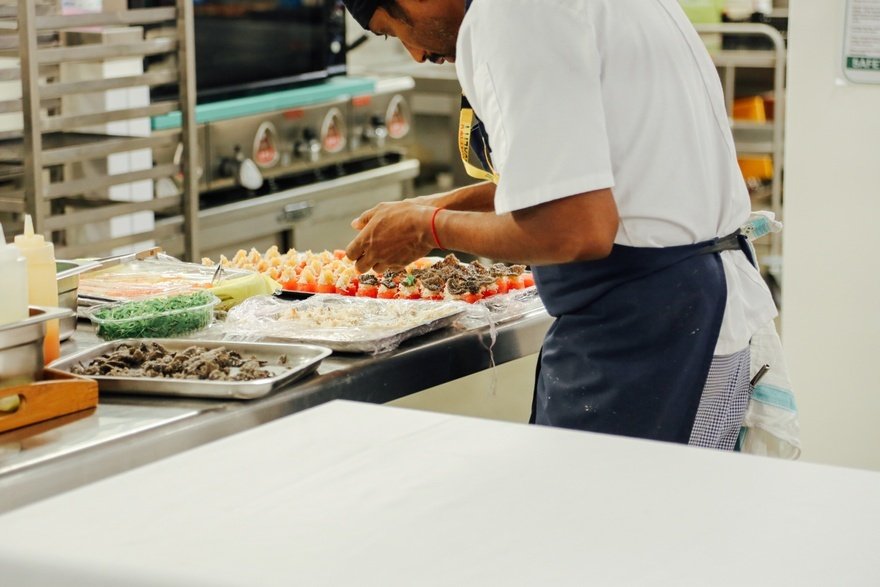Breaking point: Chef Len Unwin on the importance of looking after your mental health
Sheffield College lecturer Len Unwin, like many chefs, pursues perfection, but over time this transformed into overwhelming feelings of inadequacy and depression. He tells his story
In May the Craft Guild of Chefs partnered with mental health charity Kelly's Cause Foundation to offer help to its membership. This prompted Len Unwin, chef and lecturer at Sheffield College's City Campus, to talk to the guild's chair, Andrew Bennett, about his own struggles.
Here, Unwin shares his story about depression while working in an industry that is slowly waking up to the impact of mental health and learning ways to support those who are experiencing issues.
I come from a hospitality family and some of my earliest memories are of joining my mum in the kitchen where she worked. We'd lost my dad when I was very young, so mum and I were very close. It was inevitable that I would be a chef.
However, despite my background and the fact that cooking was my life, I always had a feeling that whatever I did I wasn't good enough and that I was a fraud.
I started my career part-time while in college at the Van Dyke hotel in Clowne in Derbyshire, a small mining village where I grew up. The Hathersage Inn, Henmore Grange and the Red Lion at Stonedge followed. Then, one day, I was asked to cover a teaching class at Sheffield College. Initially, I taught two days at the school and the other five were spent in a hotel kitchen, but my college teaching eventually became full time.
I'd never been massively ambitious, but I'd always been a training course junkie. My lack of confidence made me want to learn and constantly improve myself. I also wanted to forge contacts for my students to give them opportunities that I didn't have.
In the summer of 2016, I applied for an initiative that led to a placement at a Michelin-starred restaurant for a month. My wife was incredibly supportive of this stage and, looking back now, I'm lucky she was so understanding, especially as it was out of the blue and I just downed tools and went, not thinking of the impact on others.
It was an amazing experience and I forged links with that restaurant and other employers as a result that have benefited my students, but part of my need to do it was to prove to myself that I could. However, it was this constant desire to work harder than ever that led me on a path to self-destruction.
At the time, my boss only saw my eagerness and was happy to let me do more and more. In retrospect, we all need to look deeper: was I taking on too much? The more I did, the worse I thought I was. It got to the point where I was doing 60 or maybe more hours a week, not taking my full holiday allocation, and even at one point going into the college at the weekend so I could do more work. I needed to feel I was doing well and in my eyes I wasn't.
I was doing 60 or maybe more hours a week, not taking my full holiday allocation, and even at one point going into the college at the weekend
Then, one day at work, I had a tingling sensation down my arm. I was rushed into hospital with a suspected heart attack. After the tests, my doctor said I was just exhausted, that my body had given up. A rational person would have taken this as a sign to take it easy, but I did the opposite. I took one day off and then went back and worked even harder, because I thought people would judge me. Throughout the next year I had the odd wobble and dark day, but I kept it to myself.
Soon after I found myself on another training course learning a new system. But I felt I just couldn't learn it. I was standing at the back of the room and I could feel tears running down my cheeks. I'm a big guy who plays rugby and, at 50 years old, I felt this shouldn't be happening to me. I closed my book and left the room. No one saw me. I left my boss a note saying, ‘I can't do this any more'.
I went home, picked up my dog and just ran away. I walked for hours in the countryside and no one knew where I was. My wife had been contacted and had left work early and was there when I eventually came home. She took me to the doctor's, and I was given antidepressants, but I still didn't know why this was happening to me.
I plodded on and had a slip every now and then. I remember an event where I was doing petits fours and it was just me and a kitchen assistant, and I broke down in tears because, in my eyes, they just weren't good enough.
The situation hit a climax on 8 September 2017. I had been on another course and again, didn't think I was good enough. Someone had bumped my car and driven off and when I got home that Friday afternoon, my only thought was, ‘nobody needs me'.
I wasn't thinking this on the drive home and I didn't have any plans, but the house was empty and no one was due to be home for a while. I made the decision to take my own life.
I don't know how long I had been there, but we have a glass front door and I could see my wife had pulled up, home early from work. My only thought then was ‘I can't let her find me like this'. I got myself down and took myself off to shower as if nothing had happened.
Five weeks later, I was in Italy. I had won a competition with my students and I was in a bar with my friend Maxene. I told her what had happened. I said I hadn't told my wife and she told me that if I didn't, she would. I sat my wife and son down – my daughter was away at university – and told them what had happened.
They were distraught, but for the first time in my married life, I considered someone else's feelings. I was the typical chef, doing what I wanted without any thought to anyone else and going on placements was a prime example; it's very selfish. It's why a lot of chefs have broken marriages. I'm lucky mine has stood the test of time and we've been married for 32 years.
I took some time out and went back to work, but every time I stepped out of the house my wife looked worried. I couldn't let her carry the burden of what I had done and I knew I needed help. Having mental health issues catches you off guard, and I'm no different to any other chef who puts their work before their family and health. People have an image of someone who is depressed: someone meek and mild who sits in a dark room. But I'm loud and forthright, and it really can happen to anyone at any time. I'm now on the maximum dose of antidepressants and have been for two years.
I'm no different to any other chef who puts their work before their family and health
There is a stigma around taking medication, and some people have a misconception that antidepressants dumb you down. Although I'm not always razor sharp, the benefits far outweigh the negatives. The antidepressants don't take away the issues though, as they only deal with the chemical imbalance, which is why counselling is also important.
I've finally accepted this is an illness. I've also got proper help from counsellors who are working with me to look through my childhood and work out how I've got to this point. Now I've recognised it and accepted it, I can move on. I still have bad days, but my outlook now is ‘OK, I'm having a bad day, but tomorrow will be a better one'.
It's easy to beat yourself up about it, especially when you look at what is happening with Covid, where people are losing their lives. I'm fit and well – what have I got to be depressed about? But I'm not well and I have to accept that I have a chemical imbalance that you can't see.
I count myself lucky that I have an amazing marriage and that I am well, but my mantra now is tomorrow is another day and a better day. The biggest thing with mental health is the shame: of being a 50-year-old man who should be stronger, who should be the one that is driving his family. But I'm not ashamed and I want others to know it can happen to anyone, even if you think they have a perfect life.
You must accept you're doing your best, and if you're struggling, let your boss or your friends know. Help is out there and there is always somebody to listen.
Len Unwin's ways of coping
I've started a diary, which allows me to identify positives and negatives from every day. Nothing too in-depth or long, sometimes a :-) or a :-( is all I put. It helps me to see more positives than negatives in each day.
I've learned how to focus on my strengths rather than my perceived weaknesses.
I create lists of what is important. For example, I would always say my family are the most important, but in truth I was putting work and other people ahead of my family.
I've signposted a space between home and work on the drive home, a stretch of bypass where work ends and home begins. I also sing out loud – something that makes me laugh.
I plan, plan and plan ‘me time'.
How Sheffield College deals with mental health at work
Angela Foulkes, chief executive and principal at Sheffield College, says: "Len is a highly valued, well-respected and long-serving member of staff, who has taught, inspired and mentored many trainee chefs during the past 19 years.
"Len has earned the respect of colleagues, students, alumni and industry experts alike because of his passion for, and dedication to, the catering and hospitality sector, as well as his inspirational teaching and high-level professional skills.
"Our people are our most valuable asset and the key to our success. We are committed to supporting staff for their incredible commitment to our organisation; their health and wellbeing is of paramount importance. We recognise that it takes bravery to speak out, as Len has done, about mental health issues.
"The college is creating a workplace culture where wellbeing is embraced by all staff. Through our health and wellbeing strategy, which covers mental, physical and financial wellbeing, we have put measures in place during the last 12 months to raise awareness and educate line managers on how to recognise the signs and encourage staff to get support.
"These measures include the introduction of mental health first-aiders, wellbeing rapid action plans to help staff identify with their line managers what keeps them well at work, what makes them unwell and what they need to do to boost their wellbeing in the workplace.
"The college has introduced a suicide prevention safety plan providing guidance for line managers and staff. Staff can also access an employee assistance programme with 24-hour confidential counselling and support services across a range of areas including mental health.
"We recognise that mental health and wellbeing is an ongoing priority and there is more to do. We will continue to build on our vital work of supporting our staff, as well as our students, with their mental health and in light of the current unprecedented impact of Covid-19 on our professional and personal lives."
Contacts
If you need support, please call the Samaritans on 116 123 or visit www.samaritans.org. Alternatively, you can reach out to Kelly's Cause Foundation, an initiative focused on the hospitality industry, which offers a check-in chat programme.
Email chat@kellyscause.com or click here.
Continue reading
You need to create an account to read this article. It's free and only requires a few basic details.
Already subscribed? Log In













